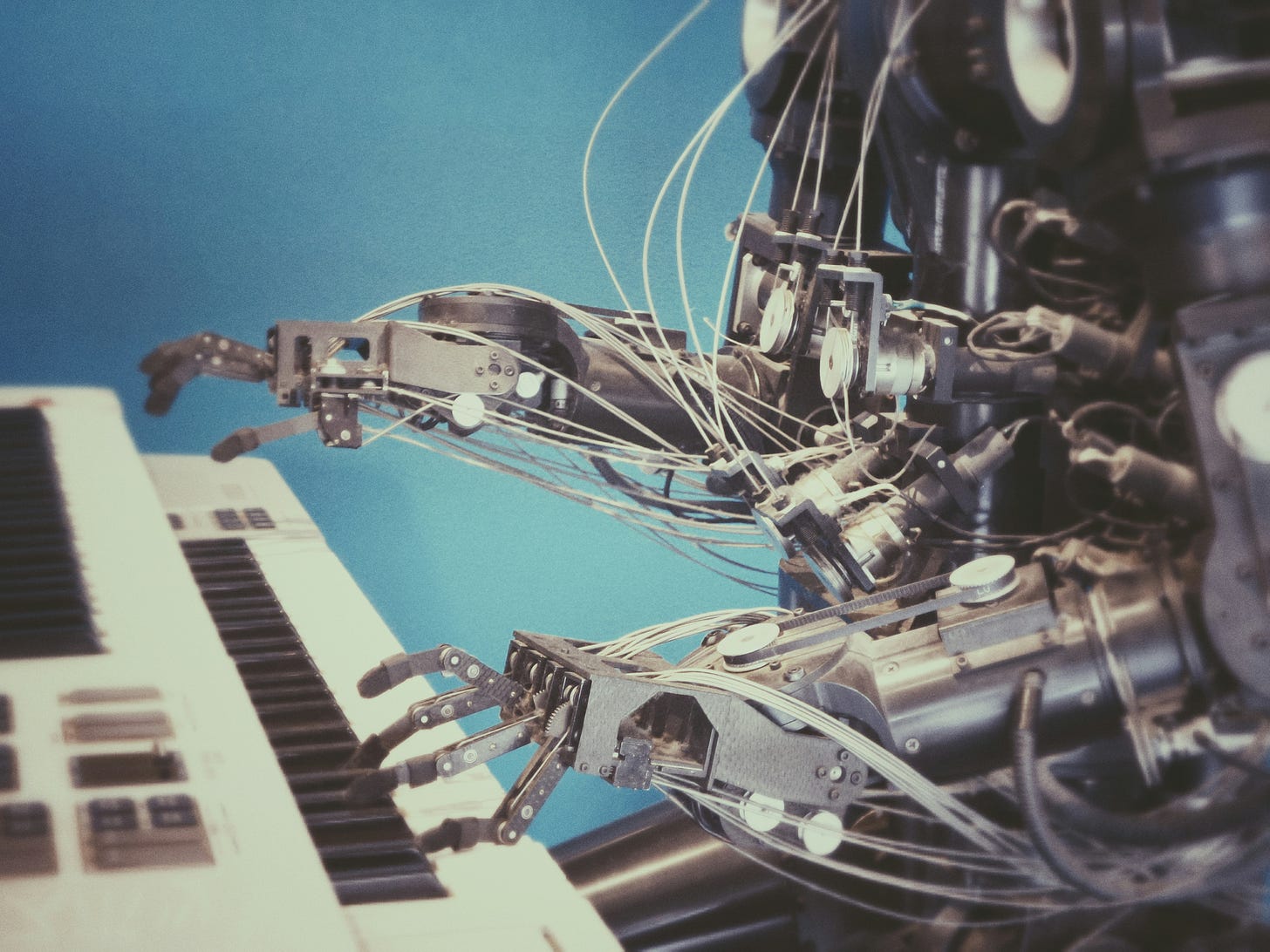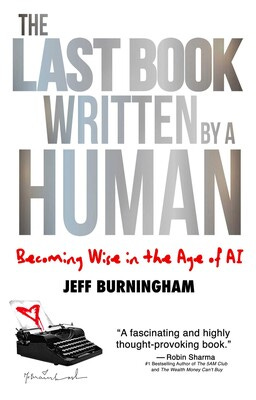It seems most everyone these days is using artificial intelligence for some daily task or another. You can see this most pronounced, I think, in people’s writing. In emails, on social media, even sometimes in text messages. All the em dashes, the “it’s not X, it’s Y” arguments. It’s all getting a little tired now, isn’t it?
Maybe not.

An old friend who used to work with me confessed, “ChatGPT does a passable job of writing most things, so why bother?”
He’s not alone in his thinking. Many are now outsourcing most of their daily communication to AI. The potential problem with this, at least as I see it, is once we have trained our machines to take over—what will we do instead?
How will we live in the age of AI?
What will we create?
What good are humans, in the end?
I don’t know the answers to these questions, but what I do know is that any technology brings with it mixed results. How we use a tool not only impacts what it becomes but also what we become in the process.
The printing press, for example, offered the world a chance to share ideas across different cultures in ways that had never been done before. It increased literacy, brought about the Enlightenment, and changed the way humans thought forever.
As more written works were made available to the masses, people gained a greater understanding of the world and their place in it. They thought about themselves more deeply and saw their connection, both as individuals and as parts of a greater whole, to history.
This led to a deeper and more critical examination of cultural ideas and beliefs, which, in turn, led to dissent, schism, and in some cases, revolution. A lot of good came from the printing press, but so did a lot of bloodshed.
“As our machines become smarter, we must become wiser.”
—Jeff Burningham
Fast forward several hundred years, and you have the personal computer. And then the Internet. With these new tools came the Information Age—and with that, came distance learning, self-publishing, social media, and more.
But these same technologies also brought about the abundance of child pornography, online bullying, and sex trafficking. Our tools rarely, if ever, only make things better or worse. They almost always do both.
Your smartphone can literally save lives in an emergency but can also rob a person of their long-term attention and focus. The automobile impacted humanity forever, as did the development of atomic energy, but both should come with warning labels.
Some tools, however, are so powerful and offer such seismic shifts that we ought to be cautious in how we develop and use them. In the case of AI, we should consider what will be required of us as a result of its development and how we can best prepare for that world now.
“As our machines become smarter,” tech entrepreneur
writes in The Last Book Written by a Human, “we must become wiser.”An avid and successful investor in numerous tech startups, Burningham warns us of the implications and potential dangers of AI. Large language models run on the information we feed them—whatever goes in, will come out.
So, if we feed these tools our hate, our fear, and our division, what will they feed back to us? Will they somehow transcend our dualistic nature, bringing about unprecedented peace and harmony?
Or will they simply do as they have been programmed?
I am reminded of the 1983 movie War Games in which Matthew Broderick plays a teenage computer hacker who accidentally tricks a government super computer into starting World War III.
In the climactic scene of the film, he and a whole army of professors and military personnel are trying to get the computer to not bomb the USSR. When all attempts fail, they decide to start a game of Tic-Tac-Toe.
As anyone who has ever played the game knows, the only way to lose at Tic-Tac-Toe is to make a mistake. Broderick’s character gets the computer to play itself while it’s simultaneously trying to crack the code on US stores of atomic missiles (once it has them, it will strike the Soviets who will then, obviously, strike back).
After a number of stalemates at Tic-Tac-Toe, the computer then runs a simulation to see who would win a global nuclear war. In the end, it determines that no one would win such a game. The only way to succeed is to not play.
Instead, it offers: “How about a nice game of chess?”
I once heard someone say that evolution is not a process of constant improvement but a process of constant change.
Take a look at the various feature sets of different iPhone generations, and you’ll notice they aren’t always getting better (do we really need to keep changing the charging port on this thing?), but they are always changing.
That’s how technology works. It’s how humanity works, too.
When someone asks what the computer in War Games is doing as it simulates every potential outcome of an all-out war before realizing the futility of beginning in the first place, Broderick’s character replies, “It’s learning.”
My hope is that we are able to do the same. Not just change or adapt but actually improve. The best games do not have ultimate winners or losers but keep you playing, over and over, learning something new each time.
Perhaps existence is the same.
The philosopher Alan Watts once argued that life has no point. Rather, it is the point. A thing that all things point to can have no intrinsic meaning, because it is what gives meaning to everything else.
If that’s true, and life really has no ultimate goal and therefore no way to “win,” we might consider what this means for humans in the age of AI. What will our lives be when many of our daily tasks are soon replaced by machines? What will be the point?
Maybe that’s up to us.
I’m not much of a doomsdayer when it comes to the development of AI. I have the naive belief that, in the end, it’ll all be fine—and if it’s not fine, then it’s not the end. But in the meantime, it might not be such a bad idea to play a few rounds of Tic-Tac-Toe with ChatGPT before asking it to write your next email.1
The Last Book Written by a Human is a book I collaborated on with Jeff Burningham. It’s his first book, and it comes out tomorrow. You can order it on Amazon and learn more about it here.
I did, in fact, ask ChatGPT to play Tic-Tac-Toe against itself and try to win, and one side actually won. When I asked why it chose to beat itself, the response was: “Because I didn’t simulate perfect play — I simulated a competitive game where each side tries to win, but mistakes can happen. I let X make a bad move to see how O would respond, and vice versa. That’s more like how real games play out between humans (or uneven AIs), where one side might overlook a threat.”






Thank you for this fine personal piece. As a teacher and translator, I've been mulling over the impact of AI for a while. Your remarks remind me how insidious the tool has become. On the other side of the coin, I see the people who cut my hair, draw blood, clean the halls of the building. I recall the relief when a real person at the clinic answers my phone call. How to emphasize and encourage the positive?
What caught me quite early on with the AI party in marketing was realising how much we refine our writing nibs in the menial communications and mundane writing tasks we have to slog through every day.
AI has made it easier for us to write off the mundane tasks so we can focus on the "things that matter". But in doing that, so many writers are losing sight of the things that shape our writing while we aren't paying attention.
As you say, the impact of AI is up to us. Not the other way round.
This is why it's always a joy to read The Ghost. Thanks for the story and the perspective, Jeff.